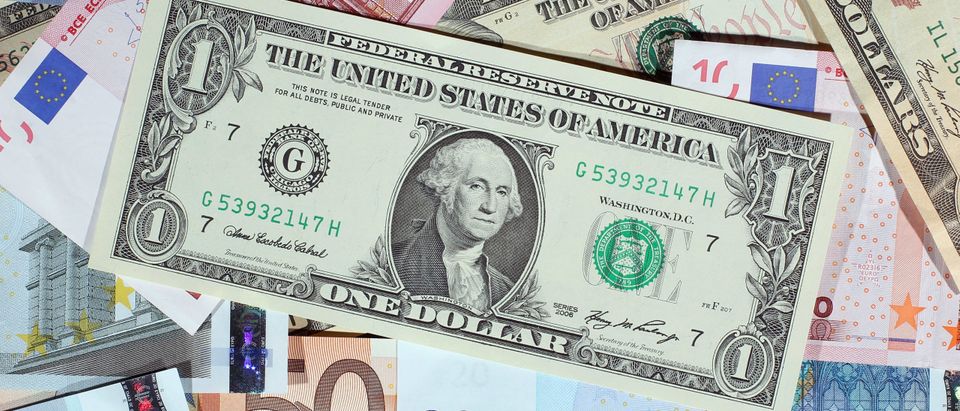Greece suffered the worst debt crisis of any advanced economy during the aftermath of the financial recession in 2008. More than a decade later, there are signs the U.S. may be heading straight for a similar situation amid an unsustainable increase in the national debt.
President Joe Biden sent his discretionary budget request for fiscal year 2022 to Congress earlier this month, which includes a $105.3 billion increase in non-defense spending from the previous year’s budget. The president also signed off on a $1.9 trillion COVID-19 relief package in early March and introduced a roughly $2.3 trillion infrastructure package later that month.
His proposed $5 trillion in long-term federal spending would constitute an unprecedented one-year increase in the national debt, which already soared more than $4.5 trillion last year due to pandemic spending, according to Federal Reserve data.

President Joe Biden speaks in the State Dining Room of the White House on April 2, 2021 (Mandel Ngan/AFP via Getty Images)
Biden is not solely responsible for increasing the national debt, a problem that has plagued past administrations as well. The national debt increased nearly $8 trillion under former President Donald Trump, and nearly $9 trillion under former President Barack Obama, according to Federal Reserve data.
The national debt is currently around $28 trillion, or roughly $85,000 for every citizen, according to the Peterson Foundation. But that does not include other forms of debt held by the American people, such as the $21 trillion owed in personal debt or the $1.7 trillion owed in student loan debt.
The federal budget deficit grew to a record $1.7 trillion in the first half of this fiscal year, largely fueled by a third round of stimulus checks, The Wall Street Journal reported. Federal spending may have helped address the economic fallout caused by COVID-19, but it has also sent the debt soaring to levels not seen since World War II. (RELATED: US Coronavirus Spending Is About To Soar Past What America Spent To Defeat The Nazis In World War II)
Federal debt held by the public reached 100% of gross domestic product (GDP) last fiscal year for the first time since 1946, and is expected to increase to a record 107% of economic output by the end of the decade, according to the Congressional Budget Office.
Greece followed a similar trajectory during its sovereign debt crisis beginning in 2009. Government debt as a percentage of GDP increased from 127% at the beginning of the crisis to around 200% in the third quarter of 2020, according to European Union data.
The country’s sovereign debt crisis was a period of economic hardship for most Greeks. Austerity measures led to unpopular spending cuts and higher taxes, along with a reduction in salaries and pensions, according to BBC News. The unemployment rate peaked at around 28% in 2013, though it was a record 58% for workers under the age of 25.

A woman walks past a graffiti referring to the Greek debt outside the Academy of Athens building on August 28, 2017 (Louisa Gouliamaki/AFP via Getty Images)
The Greek economy today is about 40% smaller than what it was before the crisis began, according to World Bank data. But Greece reached a deal with the European Union in 2018 and is now attempting to pay back more than $400 billion in government debt, CNBC reported.
A rising national debt could similarly affect the U.S. and the American people. An increase in the national debt also increases the amount of money that will have to be paid out as interest, which the budget for fiscal year 2021 allocated $378 billion towards. (RELATED: America’s Debt Burden Will Double In Next 30 Years, Congressional Budget Office Predicts)
Biden’s proposed spending plan would almost certainly require the federal government to borrow more money, and a shift in expenditures over time could affect spending on important services such as defense and entitlement programs. In Greece, this shift forced the government to introduce austerity measures that cut spending on popular services and raised taxes.
Some economists argued an increase in the national debt would prompt a return to higher inflation, which would raise prices for American consumers and households, according to the WSJ.
A rising national debt makes Treasury securities more expensive, U.S. firms could be viewed as riskier and the yield on newly issued bonds could increase in turn. This could force consumer firms to raise the prices of their goods and services, resulting in inflation over time as prices go up.
“They’re creating too much demand when it’s not needed. When demand runs away from supply, you get inflation,” former Trump chief economic adviser Kevin Hassett. “The laws of economics can’t be repealed.”


